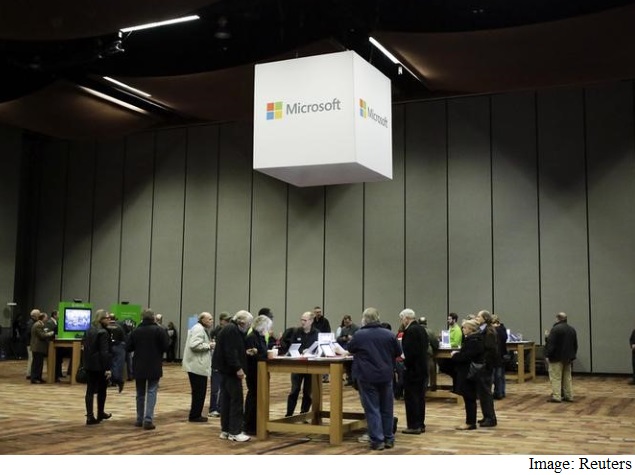- Home
- Internet
- Internet Features
- Microsoft Cash Is Seen as a Factor in Europe's Antitrust Charges Against Google
Microsoft Cash Is Seen as a Factor in Europe's Antitrust Charges Against Google

It was fined not once, not twice, not thrice but four times. Finally, after Microsoft paid more than $3 billion, Europe left it alone.
Now, Google is firmly in Europe's cross hairs: Antitrust regulators on Wednesday formally accused the company of abusing its dominance. And Microsoft is relishing a second act in Brussels, playing the role of scold instead of victim.
Microsoft has kept its coffers full for the fight, spending more on lobbying here than any European company. And Microsoft has founded or funded a cottage industry of splinter groups. The most prominent, the Initiative for a Competitive Online Marketplace, or ICOMP, has waged a relentless public relations campaign promoting grievances against Google. ICOMP hosts online seminars, panel discussions and news conferences. It conducted a study that suggested changes made by Google to appease regulators were largely window dressing.
Microsoft has links, to varying degrees, with the three initial complainants that sparked the antitrust investigation into Google. And Microsoft's activity gained momentum as a new European government re-energized the investigation. Last month, Microsoft played an important role in a delegation of American companies that met with the U.S. ambassador here, essentially asking him to let Google fend for itself against European regulators.
The two companies are the Cain and Abel of American technology, locked in the kind of struggle that often takes place when a new giant threatens an older one. Microsoft was frustrated after U.S. regulators at the Federal Trade Commission didn't act on a similar antitrust investigation against Google in 2013, calling it a "missed opportunity." It has taken the fight to the state level, along with a number of other opponents of Google.
The main battle is now in Europe, where the two companies are fighting what could be called an away game, thousands of miles from their U.S. headquarters. Policymakers are alarmed that Google's European market share is roughly 90 percent in many countries, even greater than it is in America.
"Microsoft is doing its best to create problems for Google," said Manfred Weber, the chairman of the European People's Party, the center-right party that is the largest voting bloc in the European Parliament.
"It's interesting. Ten years ago Microsoft was a big and strong company," he added. "Now they are the underdog."
None of this is to suggest that Google doesn't face serious questions about its business practices. Margrethe Vestager, the European competition commissioner, said in a news conference Wednesday that "in its general interest search results, Google artificially favors its own comparison shopping service" to the detriment of rivals. "This constitutes an abuse."
Vestager said the commission was continuing to investigate whether Google improperly copied other companies' content and used exclusivity deals to prevent businesses from using rival advertising platforms. She also formally opened an inquiry in a potent new battleground: how Google deals with competition in its Android operating system for mobile phones.
Microsoft is hardly alone in this fight, with other American technology and Internet companies lining up against Google in Europe, including Yelp, which ranks restaurants and other businesses, and TripAdvisor, a travel site. Influential European powers have also weighed in, including German publishers, who have been aggrieved by Google's tactics and its use of their content.
"The reality in Brussels is that you're either in the Google camp or the opposite camp, and that goes for companies or advisers or trade associations," said Thomas Tindemans, the chief executive of the Brussels branch of Hill & Knowlton, the public relations firm. "This is a phenomenon we've seen in the past, when the commission was going after Microsoft."
David Howard, Microsoft's deputy general counsel, said, "We have been clear all along about our concerns about Google's business practices and their effects on fair competition.
"We are one of more than 30 complainants, among many others, who have shared similar concerns with regulators hoping that competition will be restored for the benefit of consumers and businesses," he said.
Google has undertaken its own prodigious lobbying effort; its chairman, Eric E. Schmidt, has made appeals to top regulators. And it has disputed that it manipulates its search results or treats competitors unfairly.
In a statement, Peter Barron, a Google vice president based in Europe, said: "We face strong competition from many different sources. Amazon is the leader in online shopping, Booking, Expedia and Priceline are the big players in travel.
"People have lots of choice online, and that has only increased in recent years - the tremendous growth of mobile devices underlines the dynamism and constant innovation we see in the online economy."
The European inquiry started in 2010 after three obscure businesses - one French, one British, one German - filed claims against Google.
Ciao, a German comparison shopping site, claimed that its agreement to use Google's search services restricted its ability to do advertising deals with Google's rivals. The site was bought by Microsoft before the company filed its complaint.
Foundem, a British online marketplace, has argued that Google's search engine favors its own shopping services and demotes search results linked to Foundem and other competitors. Foundem was co-founded by Shivaun Raff, who went to work as an adviser to ICOMP in 2011. Raff has traveled the world attacking Google's practices, meeting with regulators and policymakers in countries that include India, the United States and Australia.
The third complainant, the French search company Ejustice.fr, has been advised by Jacques Lafitte. Lafitte, a Brussels lobbyist, previously served as a top corporate affairs official for Microsoft in Europe.
Microsoft and its allies have said there is no orchestrated effort. Lafitte was adamant in denying any connection to Microsoft.
"I haven't had any relationship with Microsoft for 10 years or more," he said.
Raff, in a statement Wednesday, said the European case was "about ending Google's ability to manipulate its unprecedented power to its own financial ends and to the detriment of consumers and innovation."
Groups in Microsoft's employ have spread their wings widely. Burson-Marsteller, a public relations firm, has long worked for Microsoft and ICOMP. After Alan Watson, a member of Britain's House of Lords, retired from Burson in 2007, another Burson executive approached him about taking on a new project.
"What we want to do is create a type of trade association," Watson said he was told at the time. "Microsoft is going to be one of the main sponsors."
The trade group, ICOMP, would largely take aim at Google, he was told. Watson is now ICOMP's chairman.
At a recent forum at a luxury hotel in London, after a brief introduction by Watson, a variety of executives began complaining about Google. An executive from the Guardian newspaper group said that Google and Facebook had a tight grip on reader data.
"We don't really like the idea of a one-off levy" by regulators, he said. An executive from the Premier League, the soccer league in Britain, said tech companies were judged by their own rules. "Competition law doesn't apply online," he said. Another attendee called Google a threat to the survival of independent artists. A Yahoo executive told other speakers "we feel your pain."
"Google is going to have to face a very serious and protracted investigation, which I hope very much will lay down new ground rules for the Internet," Watson said in an interview at his office. If the European case falters, he added, "then I think Google will be completely unstoppable actually, and it will own the Internet, in effect."
Google has not been silent. The company hired a former official from Europe's antitrust regulatory agency, Sarah Biontino, who runs a boutique lobbying firm here, and has employed other firms such as PA Europe, which has a former Belgian prime minister as its chairman. Officially, Google's spending on lobbying has tripled since 2010, which is still only a third of what Microsoft spends. But European figures are porous, and companies can exclude the firms they hire related to investigations.
The case is now in the hands of Vestager, who took over as the European Commission's competition chief in November. After five years and three failed rounds of settlement negotiations by her predecessor, Vestager has said she wants to take a new tack. And she appears to have succeeded in doing so.
"This has nothing to do with a company being European, American, Russian, Chinese or whatever," she said Wednesday. "If you want to compete in European markets you will have to do that by abiding to European competition rules."
© 2015 New York Times News Service
Catch the latest from the Consumer Electronics Show on Gadgets 360, at our CES 2026 hub.
Related Stories
- Samsung Galaxy Unpacked 2025
- ChatGPT
- Redmi Note 14 Pro+
- iPhone 16
- Apple Vision Pro
- Oneplus 12
- OnePlus Nord CE 3 Lite 5G
- iPhone 13
- Xiaomi 14 Pro
- Oppo Find N3
- Tecno Spark Go (2023)
- Realme V30
- Best Phones Under 25000
- Samsung Galaxy S24 Series
- Cryptocurrency
- iQoo 12
- Samsung Galaxy S24 Ultra
- Giottus
- Samsung Galaxy Z Flip 5
- Apple 'Scary Fast'
- Housefull 5
- GoPro Hero 12 Black Review
- Invincible Season 2
- JioGlass
- HD Ready TV
- Laptop Under 50000
- Smartwatch Under 10000
- Latest Mobile Phones
- Compare Phones
- Vivo Y500i
- OnePlus Turbo 6V
- OnePlus Turbo 6
- Itel Zeno 20 Max
- OPPO Reno 15 Pro Mini 5G
- Poco M8 Pro 5G
- Motorola Signature
- Vivo Y50e 5G
- Lenovo Yoga Slim 7x (2025)
- Lenovo Yoga Slim 7a
- Realme Pad 3
- OPPO Pad Air 5
- Xiaomi Watch 5
- Huawei Watch 10th Anniversary Edition
- Acerpure Nitro Z Series 100-inch QLED TV
- Samsung 43 Inch LED Ultra HD (4K) Smart TV (UA43UE81AFULXL)
- Asus ROG Ally
- Nintendo Switch Lite
- Haier 1.6 Ton 5 Star Inverter Split AC (HSU19G-MZAID5BN-INV)
- Haier 1.6 Ton 5 Star Inverter Split AC (HSU19G-MZAIM5BN-INV)

















